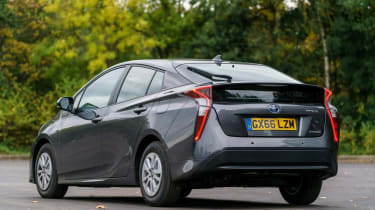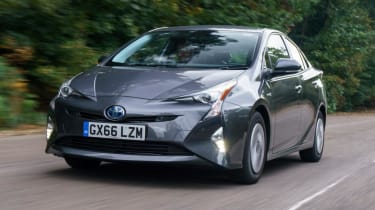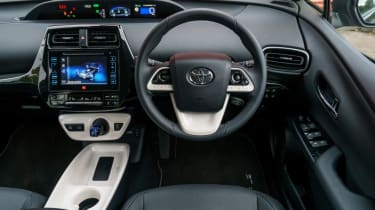Used Toyota Prius review
A full used buyer’s guide on the Toyota Prius covering the Prius Mk4 (2015-date)
The Mk4 Prius was well-received as soon as it launched; it scooped the Green Award at the Auto Express New Car Awards 2016 and followed this up with two consecutive golds (2016 and 2017) in our sister site Carbuyer’s New Car Awards for Most Economical Car and Best Hybrid Small Car. It takes a very special car to claim so many titles in such a short space of time, and there’s no doubt that the Prius is just that, with its impressive ease of use, dependability, efficiency and distinctive design.
In addition, Toyota’s new 10-year retrospective warranty means that all cars under 100,000 miles can still be covered. Having a service at a Toyota main dealer gives you a year’s top-up warranty cover, which offers added peace of mind, not that you’re likely to need such reassurance.
If one car is synonymous with hybrid tech, it’s the Toyota Prius. Many people assume this was the UK’s first petrol-electric model, even though the original two-seater Honda Insight beat it to market by a few weeks.
The Insight is long forgotten, though, and even the more practical second-generation version of the Honda has come and gone.
But Toyota hasn’t struggled to get traction in the hybrid market like its Japanese rival. It has now sold more than 200,000 petrol-electric cars in the UK, most of which are examples of the Prius. We’re now on the fourth-generation version and, as you might expect, it’s the best yet.
Models covered
- • Toyota Prius Mk4 (2015-date) - Award-winning hybrid is dependable and efficient, but not cheap to buy used.
Toyota Prius Mk4
History
The original Toyota Prius hit UK showrooms in 2000 (having been launched in Japan in 1997). Its successor followed in 2003 and the third-generation model came in 2009.
Used - available now

2020 Toyota
Prius
34,796 milesAutomaticPetrol1.8L
Cash £16,100
2020 Toyota
Prius
50,351 milesAutomaticPetrol1.8L
Cash £17,800
2020 Toyota
Prius
44,951 milesAutomaticPetrol1.8L
Cash £19,911
2018 Toyota
Prius
52,000 milesAutomaticPetrol1.8L
Cash £12,500Toyota opened the order books for the Prius Mk4 in November 2015, with the first cars being delivered to owners in March 2016; a Plug-in model arrived a year later.
All versions featured a 1.8-litre petrol engine that was boosted by an electric motor fed by its own battery pack; power was sent to the front wheels via a continuously variable (automatic) transmission. The battery is bigger in the plug-in hybrid model, and can be recharged from the mains to give an all-electric range of 34 miles.
A revised Prius was shown in late 2018, and the first cars reached dealers in spring 2019. For the first time ever there is a four-wheel-drive option (largely unnecessary for UK buyers), as well as better smartphone connectivity and a light exterior refresh with a cleaner front end.
Toyota Prius Mk4 reviews
- Toyota Prius in-depth review
- Toyota Prius review
- Toyota Prius Plug-in review
- Toyota Prius long-term test review
Which one should I buy?
There aren’t too many decisions to make when working out which Prius is right for you, because you’ve got just two powertrains to choose from (the Plug-in and the regular hybrid) and four trim levels – or just two for the Plug-in model (Business Edition Plus and Excel), which now carries less of a premium over the regular Prius. The difference is minimal on the used market, as the hybrid models seem to have kept their value better than the plug-in hybrids.
The entry-level Active trim on the regular Prius offers 15-inch alloys, LED headlights, a reversing camera, dual-zone climate control and electrically folding door mirrors.
Business Edition adds wireless phone charging, a blind spot monitor, heated front seats, upgraded trim and a colour head-up display. Business Edition Plus features self-parking and 17-inch rims, while Excel brings leather trim and an upgraded JBL stereo.
Alternatives to the Toyota Prius Mk4
If you want a hybrid that isn’t a plug-in, two worth considering are from within the Toyota fold: the C-HR and the Lexus CT 200h, both of which use a powertrain similar to the Prius’s. The CT is getting on, but the C-HR looks hi-tech and is a great car that’s let down by a lacklustre transmission. The latest Toyota Corolla also uses this hybrid engine, and both it and the C-HR are also available with a more powerful 2.0-litre hybrid powertrain.
Don’t fancy a Toyota? The Hyundai Ioniq looks more conventional than the Prius and is a little cheaper, although its hybrid drivetrain isn’t quite as sleekly integrated. There are plenty of hybrid SUVs, too, such as the Ford Kuga and Honda CR-V, plus a wide range of plug-in hybrid family-size SUVs.
What to look for
Safety kit
Blind spot monitor and rear cross-traffic alert are standard on all models, with the exception of the entry-level Active.
Spare wheel
Every Prius has a space-saver spare tyre as standard, but a full-size wheel can be made to fit if you would like the added peace of mind.
Tech
Useful features such as auto high beam, pedestrian detection, lane departure warning and adaptive cruise control are standard across the range. The infotainment system could be more intuitive to use, but models from 2020 get Apple CarPlay and Android Auto so you can use your phone’s apps if you prefer.
Safety rating
When Euro NCAP crash-tested the Toyota back in 2016, it declared it the safest large family car available to buy.
Interior
The dash design is certainly interesting, but is somewhat confusing initially. The quality is good rather than excellent, although it must be said that refinement levels are superb.
Cabin space is good overall, but the Plug-in model has just two rear seats, and headroom comes at a premium because of the sloping roof. Boot capacity is pegged at 297 litres with the seats up, or a tiny 191 litres for Plug-in models (both measured to the parcel shelf). That’s some way off a petrol-powered family hatchback like the Ford Focus or Volkswagen Golf, which both offer around 380 litres.
Running costs
Whether your Prius is a Plug-in or a regular hybrid, it’ll require maintenance every 12 months or 10,000 miles. The initial sequence is Intermediate (at £185) then Full (£335), but at 60,000 miles and then again at 100,000 miles the car needs a Full Plus service, which costs £395.
At five years old, a Prius qualifies for Silver (£120) and Gold (£200) services, under Toyota’s Essential Care discounted maintenance programme for older models.
There’s no cambelt fitted, but at 100,000 miles or 10 years the coolant needs renewing, with fresh brake fluid required every two years or after 20,000 miles. The cost of these is included in the relevant service.
Recalls
The Prius Mk4 has been recalled six times; the first in November 2016 was for a potential parking brake failure on 4,617 cars. A week later, 691 models were called back over a front passenger airbag issue - and a similar recall happened again in September 2019 for many different Toyota models. In December 2017, three cars were recalled over a faulty hybrid powertrain capacitor. A campaign in September 2018 addressed a potential fire risk in 32,000 UK examples of the Prius and Prius Plug-in, as well as the C-HR hybrid. December 2019 saw a recall for cars produced in a two-week window in the July of that year, and the latest was in June 2020 for inspection of the ECU.
Driver Power owner satisfaction
An impressive fourth place in our Driver Power 2018 new car survey shows how supremely accomplished the Prius is. It notched up quite a few top-five places – including for its engine and transmission, safety, running costs and reliability – while ride and comfort were also highly rated by owners. The lowest score the car received in the poll was for practicality. Toyota, meanwhile, continued its strong performance in our 2020 manufacturer’s list, coming sixth out of 30.













